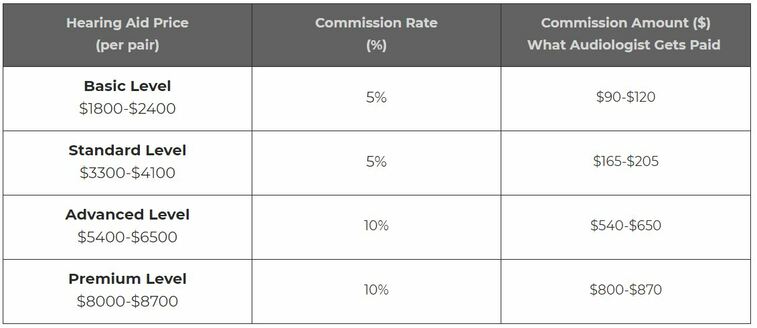
5 Questions To Ask Your Audiologist Before Buying A Hearing Aid Save 1000s
As a patient, it is easy to just accept the recommendations of a health professional without much thought. Sometimes this is not the best thing to do especially when it comes to Audiologists recommending hearing aids. This article is designed to inform you about what to ask your Audiologist so that you can be more confident that their recommendation is made with your best interest in mind. Below is the 5 questions I would encourage you to ask any Audiologist before investing money into a new pair of hearing aids. If your Audiologist cannot answer these questions, I would get a second opinion.
1. Ask your Audiologist to disclose to you any sales commissions or incentives they operate under.
By asking your Audiologist to disclose any incentive arrangements they have will go a long way to ensuring they only recommend what is clinically appropriate for you in your situation. Their readiness and willingness to divulge this information will tell you if their advice and recommendations is something to trust or be mindful of.
2. If your Audiologist recommends a higher level technology hearing aid, ask them what test results or other clinical information have they used to arrive at their recommendation.
Your Audiologist should be able to explain to you in layman’s terms how they arrived at their recommendation and why cheaper hearing aids are not appropriate for you. They should be able to demonstrate or highlight the specific hearing aid features in their recommended device that are designed to help you achieve a specific communication goal of yours. If they cannot, I would be doubtful whether their recommendation is grounded in valid and defensible clinical or scientific reasoning.
3. Ask you Audiologist to explain why the hearing aid they have recommended you is more appropriate than say a similar one from a different brand and whether they have any business agreements in place with their preferred manufacturer.
While it is common for Audiologists and Audiology clinics to have a preferred manufacturer, a lot of Audiology Clinics out there are actually owned and run by a hearing aid manufacturer. This means that your choice of hearing aids is limited to their specific brand. You are entitled to request information about all options available to ensure your investment is both informative and the best for your needs. How unfortunate would it be to spend all this money on a specific hearing aid only to find out that another brand would have been more appropriate.
4. Ask your Audiologist for a trial of the recommended technology before purchasing it.
Trying before you buy can be a great way of determining the potential benefit of the recommended hearing aid. I would recommend trialling at home or in the environments you are having difficulty in. If this is not possible, I would at least ask your Audiologist to simulate these situations and measure your speech perception with the hearing aids in. Ideally it would be good to compare your performance with more basic hearing aids if possible. Although trialling a hearing aid over a day or a week is good, performance can improve over time as your brain gets better at using and extracting meaning from the sounds it hears.
5. Ask you Audiologist for examples or testimonials of patients they have seen to demonstrate to you the outcomes they can achieve.
Although every patient is different, it would build confidence in you to see examples of patients from a variety of background who have purchased basic hearing aids as well as more sophisticated hearing aids to see how they have fared. It would be good to see that your Audiologist is able to help patients obtain good results no matter what hearing aid they choose and that these patients are happy with their results. Sometimes this information is not readily available but most clinics conduct patient satisfaction surveys which can be shared.
Commission Based Hearing Aid Sales – Why This Should Stop
It has been well documented over the last few years of the exploitative behaviour of some in the hearing aid industry who pray on vulnerable seniors and anyone for that matter who require hearing aids (ACCC enquiry, ABC report.
More recently this was again highlighted on Radio National and ABC Perth (1 hr 34 minutes into the drive program). This article will examine the nature of commission based hearing aid sales incentives and 5 ways you as a patient can mitigate it.
See also: How Pristine Hearing goes about helping you choose the right hearing aid
As an Audiologist who has been in the industry for many years now, I have seen sales incentives for Audiologists provided in a few ways. Generally speaking, the most common way to incentivise an Audiologist is to provide them commission in the form of money when a patient purchases a hearing aid they have recommended. This is quite common among the large hearing aid clinic chains who are owned by hearing aid manufacturers. Instead of paying their Audiologists a fixed remuneration like Independent Audiology clinics do, commission from hearing aid sales is added.
Companies will usually use a sliding scale meaning the more expensive hearing aids attract a higher commission compared to the less expensive ones. Below is a table that highlights how much money an Audiologist may make from commissions they receive from hearing aid sales. The commission rate is based on word of mouth and personal experience.

So as can be seen in the table above, these sales incentives are like waiving a carrot in front of a rabbit. You would be crazy to think such a model would not cloud the judgement of some Audiologists recommending hearing aids to their patients.
Another model that is used by some clinics is to provide the same commission rate regardless of the hearing aid purchased. So for example a rate of 6% maybe used across all hearing technologies. Although on face value this seems better, in reality it still serves as a way to interfere with Audiology hearing aid recommendations as a more expensive hearing aid will still attract a higher commission. In other words, 6% of a larger number is still more than 6% of a smaller number so the incentive is their to recommend a more costly hearing aid.
Let’s look at an example. Let’s say John, a 68 year old gentleman, goes to an Audiologist for help searching for hearing aids. His Audiologist performs the standard hearing tests and asks John about his background to get a feel for his situation. When it come to discussing hearing aids, John is told that he needs one of the better hearing aids available. John, not being the questioning type, accepts this recommendation. Being a more expensive hearing aid, John’s Audiologist is set to pocket a larger commission compared to the lesser amount had more basic hearing aids been recommended.
The question here is has this carrot waiving sales incentive in the form of a commission clouded the judgement and device recommendation made by the Audiologist? I recently had a patient who told me his brother had purchased hearing aids from a national audiology chain 4 years ago. His brother paid a lot of money for these hearing aids but was told by his Audiologist not long ago that he needed better hearing aids already. There was no clear justification provided for this which I was aghast at. Such blatant mistreatment of patients is something our industry needs to stamp out.
Coming back to other sales incentive programs that have been used in the industry include providing trips for staff who “sell” the most hearing aids as well as other competitions. Companies I have worked for in the past would run competitions between clinics to push the selling of higher level technology hearing aids and assistive listening devices. I found this kind of environment counter productive and did not highlight or acknowledge Audiologists who would simply recommend devices based on defensible clinical reasoning and who consistently obtained great outcomes for their clients irrespective of the devices they had chosen.
I’m not saying that all Audiologists who work with these kind of sales incentives are compromised. All I am saying is why take the risk. Audiology as a profession needs to move away from any kind of sales incentive model and rather focus solely on better patient outcomes. Hearing aids are a medical device and should be recommended or prescribed based on need and specific clinical and medical factors. As soon as our profession bans sales incentives of any kind, the sooner ALL patients can feel like their Audiologists have their best interest in mind.
To this end, Audiology Australia recently put out a public statement relating to their position around commission based hearing aid sales. This can be read here but a summary is provided below.
Audiology Australia, in our response, has called for commissions linked to sales of hearing aids to end…Audiology Australia continues to support the ACCC’s 2017 recommendation that the industry needs to prioritise remuneration structures that reward service and quality advice ahead of sales.
I am very pleased with Audiology Australia’s position on this which is far more definitive than any of their positions in the past. I do however, welcome stronger regulation from them in this regard. Audiology Australia also has a complaints handling system that patients can access if they feel they have been given questionable advice from an Audiologist.
Independent Audiologist Australia (IAA) is an organisation that represents the owners of Independent Audiology Clinics in Australia of which I am one. Their position is similar to Audiology Australia and go on to say that “commissions or bonuses contribute to high hearing device costs, create conflicts of interest and are not usually transparent to patients or their referring doctors.” For more details about IAA’s position as well as other negative factors associated with commission based hearing aid sales, visit the link here. IAA also placed an advertorial in the online Seniors Newspaper recently which comes down hard on those clinics who still use these incentive schemes and promotes that patients only go to Independent Audiology Clinics for unbiased ethical advice regarding their hearing. I recommend you reading this article here.
If you are patient needing help with your hearing and are likely to need a hearing aid I would recommend you go to an Independent Audiology Clinic like Pristine Hearing who unashamedly promotes their clinic as a SALES COMMISSION or SALE INCENTIVE free zone. I know I would feel more comfortable in that kind of clinic as well as feel more confident in any recommendations made to me by their Audiologist.
If for whatever reason you can not be seen by an Audiologist from an Independent Audiology Clinic, the above list of 5 questions you should ask your Audiologist should keep you in good stead.
Final Note
Not one to pump up our own tyres but Pristine Hearing is a proud Independent Audiology Clinic that does not have any sale commissions or incentives which could cloud our hearing aid recommendations or any device for that matter. Our only incentive is good patient outcomes. This means our recommendations are usually made in conjunction with the individual and/or family and have clear clinical reasoning behind it. We will usually educate our patients about hearing devices from multiple brands and highlight the key features that are relevant and are connected to a communication goal the patient is trying to achieve. We conduct clinical tests that are necessary for building a picture of the patient’s physical hearing abilities to determine likely outcome with basic versus more sophisticated hearing aids. Lastly, Pristine Hearing offers FREE trials and a 60 day MONEY BACK guarantee to give our patients piece of mind.
If you would like the privilege of being seen at Pristine Hearing to achieve the hearing results you deserve, call 08 6336 7170 or book online today.
